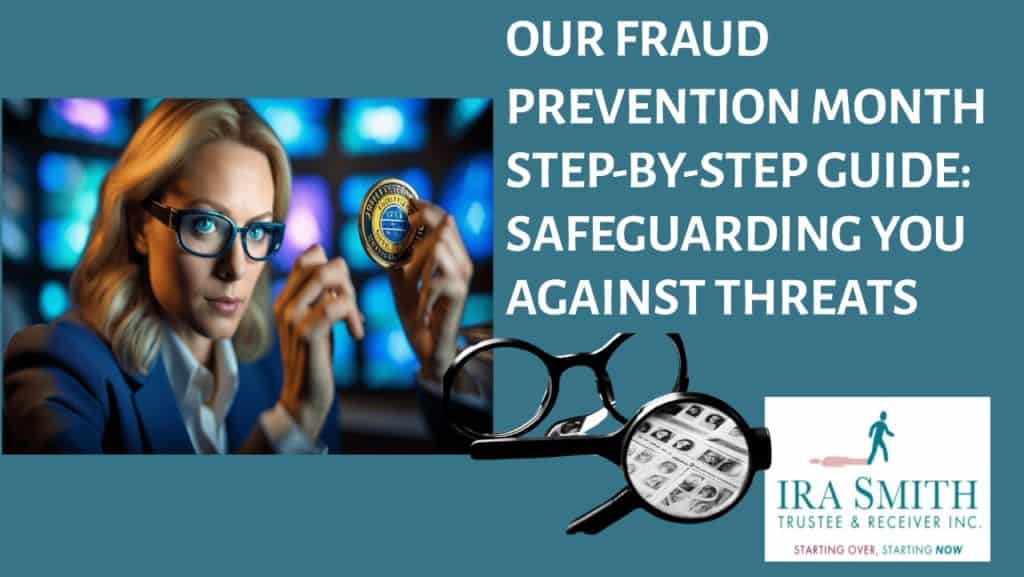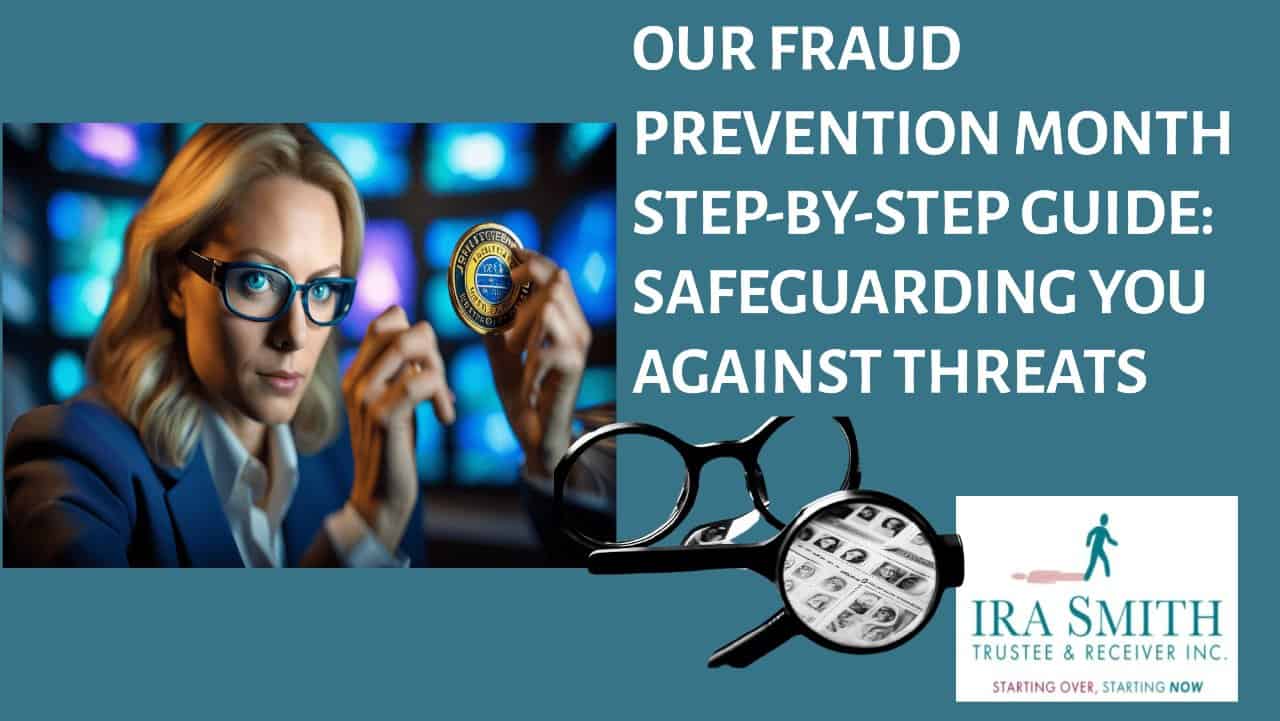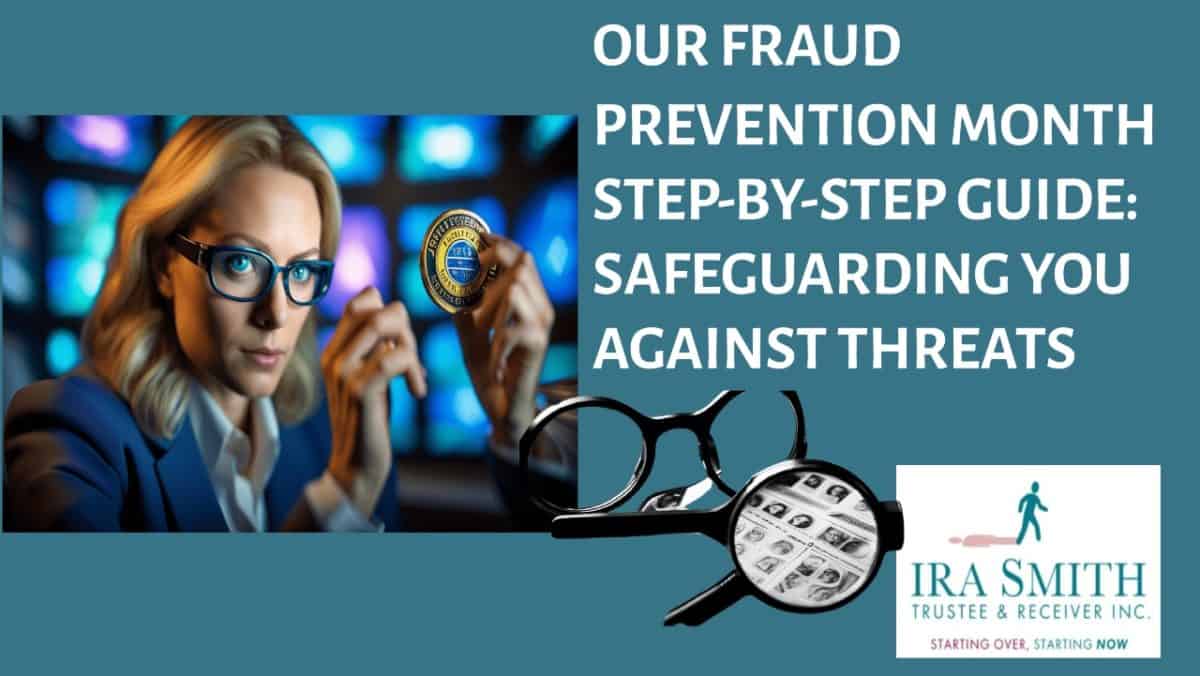fraud prevention month
Fraud Prevention Month: Introduction
March is the month-long campaign known as Fraud Prevention Month. In this Brandon’s Blog, I provide a comprehensive step-by-step guide to help you protect yourself against fraud. I cover a range of topics including how to identify common scams, secure your personal information, and safeguard your financial accounts.
I walk you through practical tips and strategies for fighting fraud to keep your sensitive data safe from cyber threats and fraudulent activities. Whether you’re a business owner or an individual looking to enhance your security measures, this is packed with valuable information to help you stay one step ahead of potential threats. Stay informed and empowered with our Fraud Prevention Month guide.
Definition of Fraud Prevention Month
The overarching purpose of National Fraud Prevention Month is a public awareness campaign for the promotion and endorsement of proactive measures and exemplary practices aimed at creating fraud awareness and fortifying defences against a myriad of fraudulent schemes, including but not confined to identity theft, financial swindles, and cybercrime.
Using engaging educational campaigns, immersive workshops, and easily accessible online repositories, this initiative endeavours to empower both individuals and enterprises, equipping them with the indispensable knowledge and tools requisite for adopting requisite precautions and effectively safeguarding themselves from the clutches of fraud.

Importance of raising awareness about fraud prevention
Fraud is a prevalent crime, especially targeting older Canadians. Fraud Prevention Month occurs every March, but fraud prevention must be a 24/7/365 effort. It is crucial to be aware of various forms of fraud and how to protect oneself. The annual observance of Fraud Prevention Month serves as a platform to foster knowledge among individuals and enterprises regarding the paramount significance of fraud prevention and safeguarding.
This month-long endeavour, held annually in March, represents a concerted collaboration between governmental entities, law enforcement agencies, and private organizations, with the shared objective of heightening awareness and provisioning indispensable resources for thwarting and uncovering deceitful activities.
Fraud Prevention Month: Canadian Anti-Fraud Centre
The Canadian Anti-Fraud Centre (CAFC) is a national organization dedicated to protecting Canadians from fraud and cybercrime. It is a partnership between the Royal Canadian Mounted Police (RCMP), the Ontario Provincial Police (OPP), and the Competition Bureau of Canada. The CAFC provides a central point of contact for reporting fraud and offers resources and education to help prevent fraudulent activities.
Through collaboration with law enforcement and government agencies, the CAFC works to disrupt and dismantle criminal networks involved in fraudulent schemes. With a focus on prevention and awareness, the CAFC plays a crucial role in safeguarding Canadian citizens and businesses from falling victim to fraud.

Fraud Prevention Month: Types of Fraud
Fraud is a prevalent issue that can manifest in various forms and using sophisticated methods, often targeting unsuspecting individuals through different mediums. Understanding the types of fraud can empower individuals to recognize and avoid falling victim to these deceptive practices. In this section, we will delve into the common types of scams, including phone calls, text messages, emails, social media posts, and impersonation.
Phone Calls
Phone call fraud, commonly known as ‘vishing,’ involves fraudsters contacting individuals via telephone to deceive them into providing sensitive information or money. These scammers may impersonate reputable organizations, such as banks or government agencies, and use persuasive tactics to manipulate their targets.
- Common Tactics: Fraudulent callers may claim that there is an issue with the individual’s account and request personal details or payment to resolve the supposed problem.
- Prevention Tips: To avoid falling for phone call fraud, it is crucial to verify the caller’s identity by asking for official contact information and confirming the legitimacy of the request with the relevant organization.
Text Messages
Text message fraud, also known as ‘smishing,’ involves scammers sending deceptive text messages to individuals, often posing as legitimate entities to trick recipients into disclosing sensitive information or clicking on malicious links.
- Red Flags: Be cautious of text messages containing urgent requests for personal information or instructing you to click on unfamiliar links.
- Protective Measures: Avoid responding to suspicious text messages and refrain from providing sensitive details via SMS. Consider blocking and reporting the sender if the message appears fraudulent.
Emails
Email fraud, commonly referred to as ‘phishing scams, involves fraudsters sending deceptive emails to individuals, typically impersonating trustworthy organizations to obtain confidential information or financial gain.
Phishing emails often contain alarming messages that prompt recipients to take immediate action, such as verifying account details or clicking on malicious links that lead to counterfeit websites.
Protect yourself from email fraud by being cautious of unsolicited emails, verifying the sender’s authenticity before responding, and refraining from clicking on suspicious links or downloading attachments from unknown sources.
Social Media Posts
Social media platforms have become breeding grounds for fraudulent activities, with scammers leveraging these channels to target individuals through deceptive posts and messages.
Stay vigilant when interacting on social media and be wary of requests for personal information or financial transactions from unknown individuals, even if they appear to be connected through mutual contacts.
Impersonation
Impersonation fraud involves perpetrators assuming false identities, whether online or in person, to deceive individuals for illicit purposes. This type of fraud encompasses various techniques, including creating fake profiles, spoofing websites, and forging official documents.
Be cautious when sharing personal information online and verify the legitimacy of individuals or organizations before engaging in any transactions or disclosing sensitive details.
By familiarizing yourself with the types of fraud discussed in this section and adopting precautionary measures, you can safeguard yourself from falling victim to deceptive practices and protect your personal information and financial assets.
Fraud Prevention Month: Common Tricks Used by Fraudsters
All of the common fraud schemes used by fraudsters have one thing in common: they can all be classified as identity frauds. They all either give you just enough information for you to think that their identity is legitimate or they are aimed at stealing your identity. The main common tricks used in a fraudster’s toolbox of actions are listed below.
Pretending to be Government Agencies
Fraudsters often use the guise of legitimate government agencies to deceive unsuspecting individuals. They may impersonate officials from organizations like the IRS, Social Security Administration, or other government entities to instill fear and coerce people into providing sensitive information or making payments.
These scammers may reach out via phone calls, emails, or even physical mail, using tactics that create a sense of urgency or importance. They might claim that there are issues with your taxes, social security benefits, or other matters that require immediate attention.
It’s crucial to remember that government agencies typically communicate through official channels and do not demand immediate payments over the phone or via email. If you receive such requests, verify the authenticity of the communication by contacting the agency directly through their official contacts.
Impersonating Banks
Bank frauds are a common trick used by fraudsters to impersonate banks and financial institutions. They may send fake emails or text messages that appear to be from your bank, asking you to confirm account details, and banking details, update information, or click on a link to resolve an urgent issue.
These frequent phishing attempts can be sophisticated, with fraudulent websites that look remarkably similar to the bank’s official site. By tricking individuals into revealing their login credentials, account numbers, or other sensitive data, scammers can gain unauthorized access to financial accounts and commit identity theft.
To protect yourself from such scams, never click on links or download attachments from unsolicited emails or messages claiming to be from your bank. Instead, directly visit the bank’s website or contact their customer service to verify the authenticity of any communications.
Posing as Friends or Family
Another deceitful tactic fraudsters employ is posing as friends or family members in distress. This type of scam often occurs over the phone, with the scammer claiming to be a relative who is in trouble and urgently needs financial assistance. Grandparent scams are a very common type of family scam where the caller poses as a grandchild trying to bamboozle elderly people out of their money.
These are also known as emergency scams as they create an imminent situation requiring immediate action to attempt to separate you from your money.
These scammers rely on creating a sense of urgency and emotional distress to manipulate their victims into sending money or disclosing sensitive information. They may provide a convincing story about being stranded, facing a medical emergency, or encountering legal troubles to evoke empathy and prompt a quick response.
Before providing any financial aid or personal details in such situations, take the time to verify the caller’s identity by asking personal questions that only your real family member would know. It’s essential to stay vigilant and cautious, especially when dealing with unexpected requests for assistance.
Tricking for Personal Information
Fraudsters are adept at tricking individuals into divulging personal information that can be used for identity theft or financial fraud. This can occur through various means, such as spear phishing emails, fake websites, or even in-person interactions.
Common tactics include posing as legitimate companies or organizations and requesting personal details such as social security numbers, birth dates, or account passwords. They may use social engineering techniques to manipulate individuals into providing sensitive information without realizing the potential risks.
To safeguard your personal information, be cautious about sharing sensitive data online or over the phone, especially if you did not initiate the communication. Legitimate companies will not ask for such details unsolicited, so always verify the identity of the requester before disclosing any personal information.
Stealing Money
Ultimately, the primary goal of fraudsters is to steal money from unsuspecting individuals through various deceptive schemes. Whether it’s through identity theft, fake investment opportunities, bogus charity appeals, or lottery scams, these criminals target people’s finances for illicit gains.
Scammers may promise unrealistic returns on investments, ask for donations to phony causes, or claim that you’ve won a prize that requires payment to receive. By preying on people’s greed, compassion, or desire for quick financial gains, fraudsters manipulate them into parting with their money.
To avoid falling victim to money-stealing scams, exercise caution when presented with offers that seem too good to be true or require immediate payment. Conduct thorough research, consult with trusted advisors, and never feel pressured to make financial decisions hastily.
Romance Scams
Romance scams, also known as catfishing, are a growing issue in the online dating world. These scams involve individuals creating fake profiles on dating websites and apps to lure unsuspecting victims into a fraudulent relationship. The scammers often use attractive photos and personal information to gain the trust of their targets and eventually ask for money or personal information.
These scams not only result in financial losses for the victims but can also have a devastating emotional impact. It is crucial for individuals to be cautious and vigilant when using these platforms and to be aware of warning signs such as inconsistent stories and requests for money. It is also important for dating websites to implement strong security measures to prevent such scams from occurring.

Fraud Prevention Month: Tips to Protect Yourself
It’s crucial to be vigilant and proactive when it comes to protecting yourself from fraud and scams. By following these tips and being aware of potential risks, you can safeguard your personal information and finances. Here are some essential precautions to consider:
Be Alert and Skeptical
One of the most important things you can do to protect yourself from fraud is to stay alert and be skeptical of any unusual requests or offers. If something seems too good to be true, it probably is. Trust your instincts and don’t hesitate to question the legitimacy of any communication or proposition.
Verify the Source of Contact
Before sharing any personal information or engaging in romance scams, also known as catfishing, are a growing issue in the online dating world. These scams involve individuals creating fake profiles on dating websites and apps to lure unsuspecting victims into a fraudulent relationship.
The scammers often use attractive photos and personal information to gain the trust of their targets and eventually ask for money or personal information. These scams not only result in financial losses for the victims but can also have a devastating emotional impact. It is crucial for individuals to be cautious and vigilant when using these platforms and to be aware of warning signs such as inconsistent stories and requests for money.
It is also important for dating websites to implement strong security measures to prevent such scams from occurring.hish transaction, always verify the source of contact. If you receive a phone call, email, or message requesting sensitive data, take the time to confirm the identity of the sender. Look up official contact information and reach out independently to ensure the validity of the request.
Avoid Sharing Personal Information
Never disclose your personal information, such as your Social Insurance Number, bank account details, or passwords, to unknown or unverified sources. Legitimate organizations will never ask for sensitive data over unsolicited calls or messages. Be cautious and protect your privacy at all times.
Sharing Information and Intelligence With CAFC
If you suspect that you have been targeted by a scam or fraudulent activity, don’t hesitate to contact the CAFC for guidance and support. They can provide valuable advice on how to proceed, report incidents, and protect yourself from further harm. Stay informed and seek assistance when needed.
Stay Cautious and Avoid Scams
Lastly, maintain a cautious attitude and stay informed about common scams and fraud tactics. Educate yourself about the latest schemes and warning signs to avoid falling victim to deceptive practices. Remember that prevention is key, and by staying vigilant, you can protect yourself and your loved ones from potential harm.
By following these tips and staying proactive in safeguarding your personal information, you can reduce the risk of falling prey to fraudsters and scammers. Stay informed, trust your instincts, and remember that your security is paramount. Protect yourself by being alert, verifying sources, avoiding sharing personal data, seeking advice when needed, and staying cautious at all times.
Fraud Prevention Month: Actions to Take if Scammed
Being a victim of fraud is a distressing experience, but it’s important to take action promptly to mitigate any further damage. Here are the recommended steps to follow if you’ve fallen victim to a scam:
Contact Local Police
If you have been scammed, contacting your local police department is crucial. Provide them with all the necessary information and details about the scam. This not only helps in potentially catching scammers but also adds to the statistics that can be used to track and prevent future scams.
Report the Incident
Reporting the scam is essential for several reasons. It helps in documenting the incident, which can be useful for any legal actions that might follow. Additionally, reporting the scam to the appropriate authorities or consumer protection agencies can help in warning others about similar scams.
Seek Help from Trusted Individuals
Seeking support from trusted individuals such as family, friends, or even professionals can provide emotional assistance and guidance on the necessary steps. They can offer a different perspective and help you deal with any feelings of embarrassment or vulnerability that may arise from being scammed.
Stay Vigilant for Future Scams
After being scammed, it’s crucial to stay vigilant and cautious to prevent falling victim to future scams. Educate yourself about common scam tactics, be wary of suspicious emails or calls, and always verify the authenticity of any requests for personal or financial information.
Stay Safe and Informed
Lastly, prioritize your safety and stay informed about the latest scam trends. Take steps to secure your personal information, such as using secure passwords and safeguarding your financial details. Stay updated on scam alerts and news to stay one step ahead of scammers.
Fraud Prevention Month: Conclusion
It is important to remember that fraudsters are always evolving their tactics and techniques, not just during this Fraud Prevention Month. It is up to each one of us to stay vigilant and educated on how to protect ourselves from falling victim to fraud. By practicing caution, establishing strong security measures, and staying informed, we can all work together to prevent and combat fraud. Let’s make fraud prevention a priority not just this month, but every month. I hope you enjoyed this Fraud Prevention Month Brandon’s Blog.
Individuals and business owners must take proactive measures to address financial difficulties, consumer debt and company debt and promptly seek assistance when necessary. It is crucial to recognize that financial stress is a prevalent concern and seeking help is a demonstration of fortitude, rather than vulnerability. Should you encounter challenges in managing your finances and find yourself burdened by stress, do not delay in pursuing aid.
Revenue and cash flow shortages are critical issues facing people, entrepreneurs and their companies and businesses with debt problems that are in financial distress. Are you now worried about just how you or your business are going to survive? Are you worried about what your fiduciary obligations are and not sure what to do?
The Ira Smith Team understands these financial health concerns. More significantly, we know the requirements of the business owner or the individual who has way too much financial debt. You are trying to manage these difficult financial problems and you are understandably anxious. It is not your fault you can’t fix this problem on your own and it does not mean that you are a bad person. The pandemic has thrown everyone a curveball. We have not been trained to deal with this. You have only been taught the old ways. The old ways do not work anymore.
The Ira Smith Team uses innovative and cutting-edge methodologies, to adeptly navigate you through the intricacies of your financial challenges, ensuring a resolution to your debt-related predicaments without resorting to the rigours of the bankruptcy process. We can get you debt relief now! We have helped many entrepreneurs and their insolvent companies who thought that consulting with a Trustee and receiver meant their company would go bankrupt. On the contrary. We helped turn their companies around through financial restructuring.




